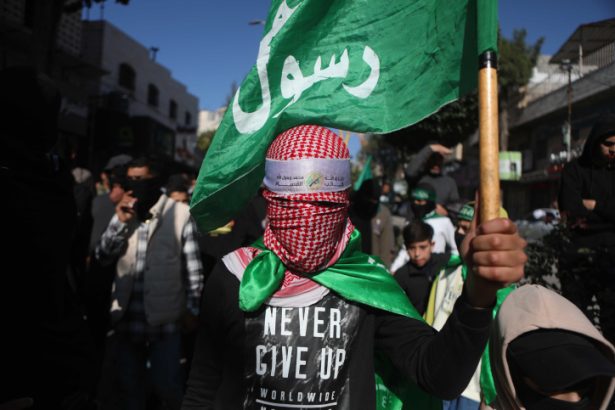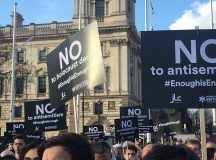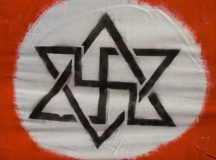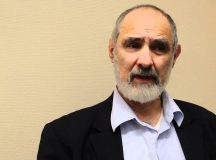Ingo Elbe and Enrico Pfau of Carl von Ossietzky University of Oldenburg map the several ways in which those historians who signed an open letter opposing any reference to the Holocaust in discussions of the 7 October Hamas Pogrom – on the ground that such references were an abuse of Holocaust remembrance – are badly wrong.
Holocaust without Antisemitism
Renowned historians have written an open letter.[1] The reason: the use of Holocaust and Nazi references in connection with the Hamas massacre on 7 October. The authors consider these references to be abusive and dangerous – not only in certain individual cases, but in general. But are they right? The open letter begins with a few examples. Reference is made to Joe Biden’s assessment that the barbarism of Hamas is just as consequential as the Holocaust. It mentions the statement Netanyahu made to Olaf Scholz: ‘Hamas are the new Nazis.’ And finally, the authors quote Republican politician Brian Mast rejecting the talk of innocent Palestinian refugees and pointing out that in the Second World War there was no mention of innocent Nazi civilians either.
The authors do not discuss any of these statements in detail. They apparently consider themselves exempt from this duty because, in their view, any reference to the Nazis in the case of Hamas is out of the question. Why? The reader does not learn much about this. In fact, it is a single sentence that is supposed to carry the burden of proof: ‘The Nazi genocide involved a state—and its willing civil society—attacking a tiny minority, which then escalated to a continent-wide genocide.’ These criteria do not apply to Hamas and its actions. But are they even sensible criteria at all?
At first, it is remarkable what the authors do not mention: the antisemitic mania. They simply ignore the significance of the annihilationist ideology of antisemitism for the Nazi perpetrators and their willing civil society. However, if one takes this into account (and research on the perpetrators leaves no doubt that one should), the question immediately arises as to whether the authors have set the right priorities in their choice of criteria: For the antisemitic mania, it is not decisive whether a state is involved and who is the majority or minority respectively.
But let’s assume for a moment that these criteria are pertinent: Are the Jews in the Middle East not a minority? Regarding the terrorist attacks of 7 October, the connection between Iran, Hamas, and Hezbollah should not be neglected. In the case of Iran, there was, and still is, a state involved in the current threat to Israel. Here we are dealing with state and para-state antisemitism. Hamas, Hezbollah, Al-Aqsa Brigades, Palestinian Islamic Jihad, Lion’s Den, Jenin Battalion and the like would certainly be in a position to expel or even destroy the Jews of Israel, if it had not taken massive defensive measures. Once Iran has succeeded in developing a nuclear bomb, it will undoubtedly be able to do so.
Indeed, this genocide would not extend over an entire continent, but simply because there are hardly any Jews left in the region outside of Israel. Since the 1940s, hundreds of thousands of them have been expelled from the Islamic states or have voluntarily emigrated to the only state that offers them security and freedom.
Israel as perpetrator (I)
The above-mentioned definition of the Holocaust serves yet another purpose. The authors of the open letter thereby not only criticise historical references but implicitly also accuse Israel. They suggest that there cannot be another Holocaust because Israel, unlike the Jews of that time, can defend itself and can no longer be considered an innocent victim.
On the one hand, the authors say that those who do not have a state cannot commit such a genocide. And who has no state? The Palestinians. On the other hand, statements made by two leading Israeli politicians about an alleged battle ‘between the children of light and the children of darkness’ and against ‘human animals’ (which were made under the immediate impression of 7 October) are presented as implying genocidal intentions. These statements, they say, ‘bring to mind echoes of historical mass violence’.
One of the signatories, Raz Segal, even openly calls Israeli warfare ‘A Textbook Case of Genocide’. Holocaust researchers Jeffrey Herf and Norman Goda commented: ‘[U]nlike Hamas’s longstanding dogma, such comments reflect the sense of shock and anger Israelis felt only days after the worst massacre in their young nation’s turbulent history. […] More importantly, words like “animals,” dehumanizing though they may be, do not reflect Israeli government policy toward civilians.’[2]
It is particularly striking how little the authors of the open letter have to say about antisemitism, which should be the main point of any Holocaust analysis. The antisemitism of Hamas is only vaguely alluded to or appears as a numinous threat without naming its actors. At one point they even say: ‘Antisemitism often increases at times of heightened crisis in Israel-Palestine, as do Islamophobia and anti-Arab racism.’ As if antisemitism were a consequence of the crisis – which, as we will see, was allegedly triggered exclusively by Israel – and not primarily its cause.
Nowhere in the open letter do we learn what antisemitism is. All we get is the explanation that we need ‘clarity about antisemitism so that we can properly identify and combat it.’ What many of the signatories think about antisemitism (e.g. Moses, Segal, Schüler-Springorum, Bartov, Rothberg, Confino, Goldberg) can only be indirectly extrapolated from their signature under the scientifically highly questionable pamphlet of the ‘Jerusalem Declaration on Antisemitism,’ which even allows for the demonisation of Israel to be labelled ‘not antisemitic per se’ – with reference to the presumed intentions and experiences of Palestinians, among other things.
Entanglement of National Socialism and Hamas ideology
Let us move on to the issue the authors thought they could avoid with their Holocaust definition: Indeed, the Hamas henchmen are not typical Nazis and the Hamas pogrom was not the Holocaust. Of course, one can also discuss the theoretical differences between Islamic and Nazi antisemitism.
The institution of dhimmitude in traditional Islam usually allowed Jews to survive and practise their faith – as long as they agreed to the Islamic claim to supremacy in a state of humble submission. And as long as they accepted their status of second-class human beings at the mercy of an Islamic dominant society which also included a special tax. Inconceivable under Nazi rule, of course.
However, with its founding charter,[3] Hamas explicitly placed itself in the tradition of eliminatory redemptive antisemitism. In doing so, it reactivated the apocalyptic hadith of Abu Hurayra which prophesises that the Last Day will come only when the Muslims kill the Jews. It also combines this – in traditional Islam rather marginalised – idea with the ‘Protocols of the Elders of Zion,’ one of the most prominent documents of modern European antisemitism in which the Jews are portrayed as world conspirators behind wars, crises and modern media, and which was an important point of reference for the National Socialists.
Since the Jews dared to found a state on – in the eyes of the Islamists – Islamic soil and fought for equal rights, the difference in the intention of extermination is only a theoretical one anyway, because for Hamas and the like it justifies the mass murder of Israel’s Jews: As Hamas preacher Yunis al-Astal puts it, ‘[w]e must massacre [the Jews] … to prevent them from sowing corruption in the world … We must restore them to the state of humiliation imposed upon them … They must pay the jizya security tax while they live in our midst … However, in Palestine, where they are occupiers and invaders, they cannot have the status of dhimmis.’ [4]
In a letter which vehemently denies any connection between Hamas and Nazi antisemitism , all of this must not only be carefully concealed, but the connection between important leaders in the Palestinian national movement of the 1930s and 1940s, such as Mohammed Amin al-Husseini, and National Socialism must also remain anathema.
One should not only mention al-Husseini’s collaboration with the Nazis in the Holocaust, not only his open declaration that he and Germany were now jointly trying to ‘eliminate the Jewish question from the world,’[5] not only the Muslim SS units he inspected during the Second World War or his anti-Jewish propaganda for the Islamic world – but also the closing of the gates of Palestine to Jews fleeing the Nazis as a direct result of the mufti’s terror in the Palestinian Mandate in the 1930s and the British appeasement policy.
Furthermore, the Holocaust researchers’ open letter does not tell us anything about the fascist references of the Muslim Brotherhood, from which Hamas derived, and its accompanying umma-socialist third-way-ideology of the Islamic people’s community against interest, materialism and secularism. The socio-psychological mechanisms of the skewed healing of collective narcissistic grievances through antisemitic conspiracy theories are very similar in Hitler and Sayyid Qutb, an important intellectual leader of the Muslim Brotherhood: the Jews are suspected of being behind all materialist, feminist and individualist influences that are supposed to destroy any ‘organic’ community: ‘Behind the doctrine of atheistic materialism was a Jew; behind the doctrine of animalistic sexuality was a Jew; and behind the destruction of the family and the disruption of sacred relationships in society [….] was a Jew.’[6]
The swastikas on the fire kites of the 2018 Hamas ‘border fence protests’ were no more an anti-fascist protest than the hate sermons of Muslim Brother Yusuf al-Qaradawi, who for years had been reaching tens of millions of people via the Qatari channel Al-Jazeera and in 2009 fantasised Muslims as the accomplishers of the Nazi Holocaust: ‘Throughout history, Allah has imposed upon the [Jews] people who would punish them for their corruption. The last punishment was carried out by Hitler. By means of all the things he did to them – even though they exaggerated this issue – he managed to put them in their place. This was divine punishment for them. Allah willing, the next time will be at the hand of the believers.’
Volksgemeinschaft against Israel
The authors of the open letter deliberately ignore the fact that the leadership of the supposedly moderate PLO also propagates antisemitism and hatred of Israel, not only through their pensions for terrorists and in public statements, but also in school textbooks and youth camps.
It should be noted, however, that the Palestinians have been mobilising against Israel for decades, aiming at the destruction of the Jewish state, which is to say, not aiming at a state next to Israel, but instead of Israel. Adi Schwartz and Einat Wilf rightly emphasise that the Palestinian national movement is not a nationalism that primarily wants a state for its own people, but one that wants to prevent or destroy the state of another, namely the Jewish, people – as the PLO’s reactions to Israel’s most far-reaching peace offers in the history of the conflict in 2000 and 2008 have shown.[7]
The Hamas attack on 7 October is just as much an expression of this sentiment as the overwhelming support that Palestinians in Gaza and the West Bank show for one or another variant of eliminationist groups and their terror against Jews and Israeli civilians.
In 2014, 93 per cent of respondents in the Palestinian territories agreed with openly antisemitic statements and, according to a survey conducted in November 2023, 83.1 per cent of West Bank residents and 63.6 per cent of Gaza residents supported the Hamas massacre of 7 October. 77.7 per cent in the West Bank and 70.4 per cent in Gaza are in favour of a purely Palestinian one-state solution, i.e. one that excludes a state for two peoples and the two-state solution. Historian Benny Morris is right when he calls this attitude, which did not only just emerge over the past several weeks, an ‘expulsionist mindset.’[8] According to a survey conducted in June 2023, 66 per cent in the West Bank and 79 per cent in Gaza are in favour of the formation of terrorist groups such as Lions’ Den or Jenin Battalion.
Jeffrey Herf and Norman Goda therefore rightly ask whether this is not in fact a case of the classical phenomenon of a Volksgemeinschaft based on the antisemitic construction of a Jewish enemy, which then would fulfil the supposed criterion of the ‘willing civil society’ cited by the authors of the open letter.
The genocide rumour
This certainly does not justify the ‘collective punishment’ that the authors of the open letter claim to observe in the attack on the Gaza Strip. But that kind of punishment does not take place at all. Israel is waging a war in which it warns the civilian population of hostilities, allows for escape routes to southern Gaza and does not deliberately target civilians (both blockades and attacks on civilian infrastructure misused for military purposes are not per se illegal under international law).
Only recently, one of Germany’s leading international law experts stated that the Israeli army was ‘well aware of its obligations under international humanitarian law.’ ‘Before the air strikes began,’ says Professor Matthias Herdegen, ‘there were warnings to residents of danger zones, for example through messages in mobile networks or through so-called ‘roof knocking’ […]. In the run-up to the ground war, there had been calls for evacuation for weeks, which more and more civilians are now following – although Hamas initially wanted to hold them back. So we see a clear endeavour on the Israeli side to spare the civilian population in accordance with international law. On the Hamas side, it is exactly the opposite.’
However, the authors of the open letter do not mention the fact that Hamas has been turning the Gaza Strip into a fortress for years, spending money that could have been invested in civilian infrastructure, and that Hamas is using civilians, whether they support the organisation or not, as human shields in violation of international law. The fact that Hamas is not interested in protecting its civilian population has been stated several times by leading representatives – none of this is mentioned in the open letter. Nothing either about the fact that the Israeli civilian population has had to live under a hail of rockets since 7 October and that parts of Israel (especially in the north) have been evacuated. The authors describe the antisemitic mass murder by Hamas as an ‘attack’ and an anonymous ‘crisis’, in which the qualitative difference between the antisemitic pogrom and Israel’s warfare is levelled out by the nonchalant listing of ‘October 7th attacks and the ongoing aerial bombardment and invasion of Gaza.’
Israel as perpetrator (II)
The historians now want to investigate the ‘causes of the violence in Israel-Palestine,’ although their ‘contextualisation’ is a prime example of one-sidedness. They omit or obfuscate crucial connections and instead accuse Israel (and only Israel) of being responsible for the violence of Hamas. This reversal of victim and perpetrator roles, which stems from a simplistic and Manichean view of the Arab-Israeli conflict, is a widespread phenomenon among anti-Zionist agitators, particularly in the postcolonial milieu. But it is troubling to hear it even from some serious historians such as Omer Bartov or Christopher Browning.
The causes of conflict they put forward are quite clear: ‘Seventy-five years of displacement, fifty-six years of occupation, and sixteen years of the Gaza blockade have generated an ever-deteriorating spiral of violence that can only be arrested by a political solution.’ They deliberately conceal the fact that the Palestinian refugee problem is the result of the lost Arab war of aggression and annihilation against the Yishuv and Israel, and that there could have been a Palestinian state and peaceful relations between Palestinians and Israelis long ago if the Arab side had accepted the resolutions in favour of a two-state solution from 1937 and 1947 or the Israeli peace offers of 1967, 2000 or 2008.
Nor does it occur to them that the massacre of 7 October would have taken place long before the year 2023 if Israel had not meticulously controlled and regulated traffic to the Gaza Strip. Here, too, they show that they do not take even outright eliminatory antisemitism seriously as long as it is expressed by Palestinians – a ‘paternalistic, even neocolonial, attitude, that refuses to take Palestinians at their word,’ as Adi Schwartz and Einat Wilf describe this ‘West[s]plaining’ disguised as analysis.[9]
The authors of the open letter state: ‘insisting that “Hamas are the new Nazis’’—while holding Palestinians collectively responsible for Hamas’s actions—attributes hardened, antisemitic motivations to those who defend Palestinian rights.’ One would like to see evidence that there is even a remotely relevant Palestinian or pro-Palestinian political movement that does not negate the existence of Israel and does not want to destroy the Jewish state. Moderate Palestinian forces were silenced or even executed by the fanatics of the Mufti of Jerusalem in the so-called Arab Revolt between 1936 and 1939. This is an enormous historical burden for Palestinian society which has additionally been ideologically indoctrinated with the revanchist narrative of the alleged right of return of the 1948 refugees with the support of UNRWA since at least the 1960s. With the exception of isolated dissidents such as Bassem Eid, Mosab Hassan Yousef or Ahmad Mansour, who have no influence in the community, the vast majority of publicly perceptible Palestinian voices fails to recognise the Jewish state and to condemn the terror of Hamas without ifs and buts.[10] They often do not even support the slogan ‘Free Gaza from Hamas’ or they even glorify the terror of the Islamists, as is the case with the self-proclaimed ‘progressive grassroots movement’ ‘Palestine Speaks’.
Entanglements are welcome, but not when it comes to antisemitism
Co-signatories of the open letter, such as Dirk Moses and Michael Rothberg, have been working for years to relativise the Holocaust by placing it in the ‘biopolitical continuum’ of state refugee policy, colonial rule and mass crimes. In doing so, the memory of the Shoah is to be ‘multidirectionally entangled’ with all possible memories of mass crimes. In the end, it is striking that particularly those scholars want to separate the greatest antisemitic mass murder since the Holocaust, perpetrated by an organisation that places itself in the tradition of eliminatory hatred against Jews, from any connection with the Holocaust and National Socialism.
[1] This article first appeared in German at MENA Watch. (https://www.mena-watch.com/missbrauch-der-holocausterinnerung/)
It has been translated by Johannes Bruns. We would also like to thank Peter Kathmann and Christoph Hesse.
[2] A systematic critique that shows how Raz Segal misinterprets the quotes he cites and how he constructs his genocide accusation can be found here: https://www.threadreaderapp.com/thread/1727736572592677106.html
[3] As to the fact that Hamas’ so-called ‘Second Charter’ is nothing more than a strategic PR manoeuvre for the Western public and in no way overrides the First Charter, see https://www.mena-watch.com/friede-mit-der-hamas-aussichtslos/ and https://www.hagalil.com/2023/10/zweite-charta-der-hamas/ and https://www.spiegel.de/international/world/ex-hamas-head-meshal-on-trump-s-mideast-peace-initiative-a-1150471.html.
[4] Quoted from Richard Landes, ‘Jihad’, in: C. Nelson: Dreams Deferred. A Concise Guide to the Israeli-Palestinian Conflict & the Movement to Boycott Israel. Bloomington, 2016, p. 219.
[5] Quoted from, Klaus-Michael Mallmann and Martin Cüppers, Halbmond und Hakenkreuz. Das Dritte Reich, die Araber und Palästina. 3rd ed. Darmstadt, 2011, p. 115.
[6] Sayyod Qutb, ‘Our Struggle with the Jews’, in A.G. Bostom (ed.): The Legacy of Islamic Antisemitism. From Sacred Texts to Solemn History. Amherst/New York, 2008, p. 359f.
[7] Cf. Adi Schwartza dn Einat Wilf, The War of Return. How Western Indulgence of the Palestinian Dream has Obscured the Path to Peace, New York. 2020, p. 2-3 and chapter 5.
[8] Benny Morris, 1948: The First Arab-Israeli War. New Haven/London, p. 409.
[9] Schwartz/Wilf: The War of Return, New York, 2008, p. 177-178.
[10] Even the Palestinian philosopher Sari Nusseibeh, celebrated as the ‘voice of peace’, trivialises the Hamas massacre as an ‘act of war’ and justifies Hamas’ terror with the ‘terror of Israel’: Interviewer: ‘But nothing justifies the terror of Hamas? Nusseibeh: Except the terror of Israel.’ (https://www.fr.de/kultur/gesellschaft/der-palaestinenser-sari-nusseibeh-dieser-konflikt-muss-an-den-wurzeln-geloest-werden-92651158.html).



































